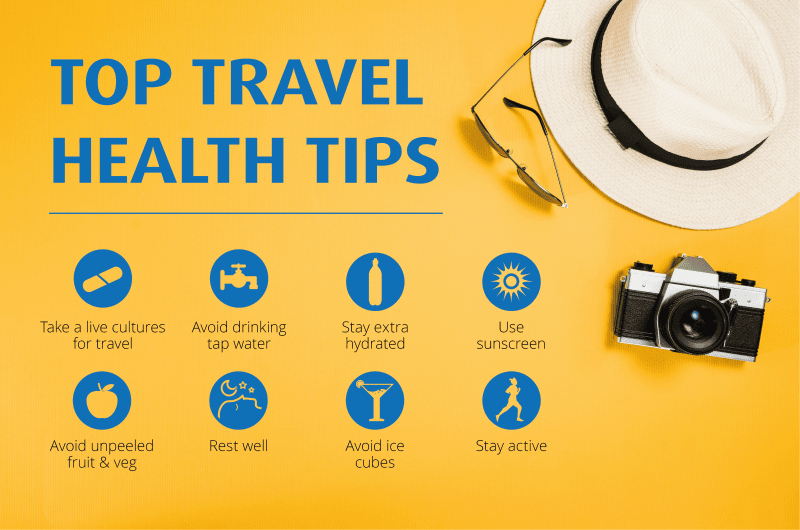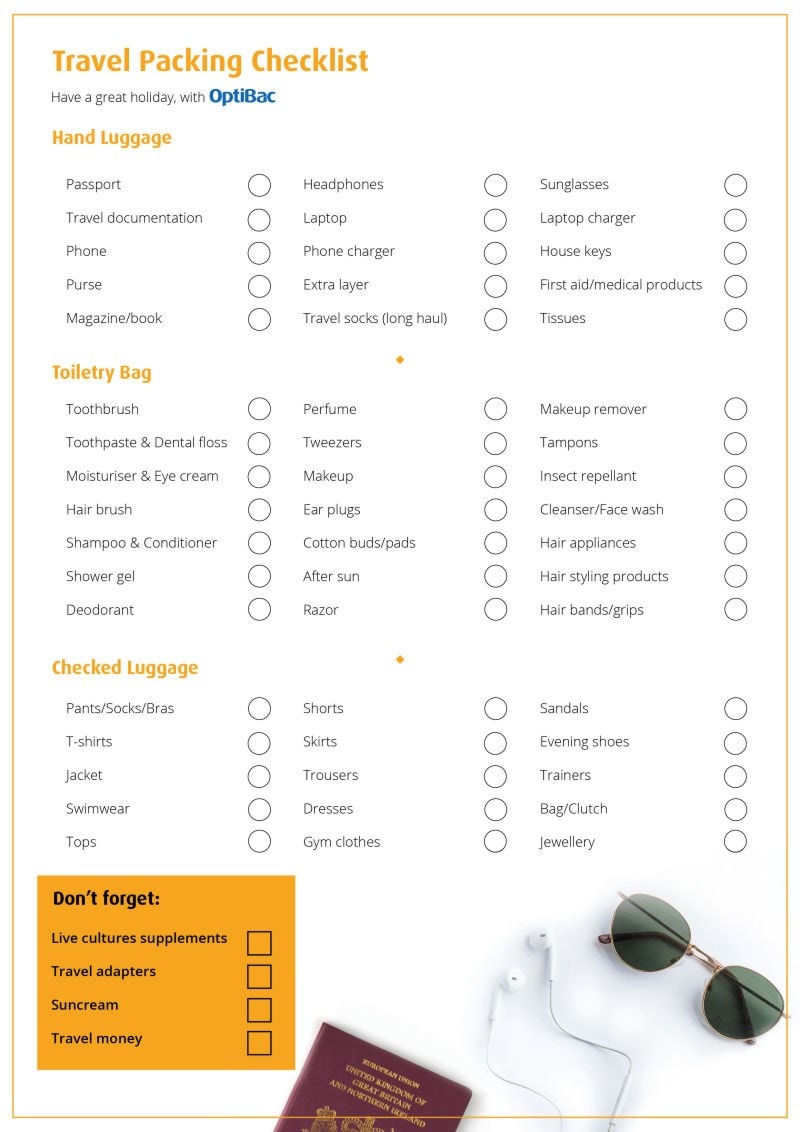You're away from FREE US delivery Free US delivery (applied at checkout) on orders over $60.00
You have qualified for Free US delivery
Lifestyle
Staying Healthy When Travelling Abroad
Holidays, backpacking, honeymoons: they're all super exciting, however they can be stressful for your gut. Use our healthy travel tips to help keep your gut happy when going abroad.
How travel impacts the gut
Let's start with an introduction to the gut...
The gut is home to trillions of microorganisms, including good and bad bacteria. This bacteria influences many areas of our health, including digestion and susceptibility to disease.
When we travel, there's lots of factors that can upset our gut bacteria and cause illness. Nasty bacteria or intestinal viruses can be picked up whilst abroad, leading to upset tummies. In fact, up to 70% of travellers visiting countries with hotter climates like India, Mexico and Thailand experience tummy troubles whilst away.
Because of this, we've put together a simple list of top tips to get your travels off to the smoothest possible start and see you through your trip safely.

1. Pack wisely
First up, make sure you stay well whilst abroad by packing for all eventualities. Ample sun protection is always a must, as well as emergency food rations, especially if you have any dietary restrictions. First aid supplies, including antiseptic and after-sun relief, are also a good idea. If you do like to travel with your daily dose of friendly bacteria too, be sure to pack a supplement that's suitable for travel and promises to survive at hotter temperatures!
2. Stay hydrated
If you become thirsty, you are already dehydrated. It is so important to keep your fluids up in warmer weather, as water loss is increased due to the higher levels of perspiration. Dehydration can cause issues throughout the body and contributes further to upset stomachs, so make sure you keep sipping plenty of water - especially when drinking alcohol, which can dehydrate you quickly. It's also prudent to be aware that, in many countries, water is not purified in the same way as the UK. That's why it is sometimes safer to drink bottled or boiled water in certain places, despite the environmental implications, so check this before you travel. This also applies to ice cubes, which, unless prepared yourself, may be made from the same unpurified tap water frozen repeatedly.
3. Don't skimp on sunscreen
Getting out in the sunshine is hugely important, in order to maintain healthy vitamin D levels and improve your mood. However, we're often not used to the intense heat and UV rays we experience abroad. This means we can easily fall prey to sunburn, heat exhaustion or even heatstroke, which can wreak havoc on your gut. Make sure you spend some time in the shade each day and use plenty of sunscreen to protect your skin, your gut and even your brain from sun damage. Look for suncreams that are factor 50+ and protect against both UVA and B rays.

4. Avoid unpeeled, raw fruit and veggies
Like with the local water, we also recommend you remain conscious about the food you consume whilst abroad. This means being aware of any opportunities for contamination that your meal might have had before reaching your table. For example, unpeeled, raw fruit and vegetables will often have been washed in tap water and, as a result, will carry all the same risks as drinking that water would. Therefore, we advise you stick to a cooked version of your five-a-day, or wash any raw fruit and vegetables yourselves in boiled, bottled or purified water.
5. Get plenty of rest
Your gut and sleep patterns work with with one another. When you get a poor night's sleep, particularly whilst away, it can compromise gut health. In order to stay in tip-top shape, a full eight hours is ideal. Holidays are for relaxing, after all!
6. Keep active
Physical exercise is excellent for maintaining overall health, but we often forget to keep up the exercise whilst away. Whilst you might want to give yourself a break from the gym during your holiday, there are plenty of fun ways to remain active. Walking tours or hikes, resort-organised activities or cycling through the local countryside are all simple ways to get some exercise in - and some sightseeing at the same time!
7. Wash your hands regularly
The last thing you want whilst away is to pick up a bug, so make sure to wash your hands thoroughly and regularly to help prevent the spread of any lurgies. Most of us still have plenty of hand sanitiser left in our bags from the last two years too, so make sure to keep some with you wherever you travel.
Bonus!
As well as tips to make sure you feel great whilst you're away, we've also got a fail-safe packing checklist for you to screenshot, download or print so you can set off on your travels fully content. Wishing you a happy, healthy trip, wherever you're planning to go this summer.
Download and/or print our tried and tested Packing Checklist!

If you liked this, see these other related articles:
Popular Articles
View all blogs-
Lifestyle16 Mar 2023
-
Lifestyle17 Dec 2024
-
Suitability08 Mar 2024


